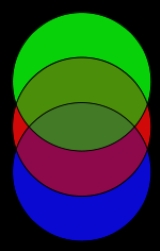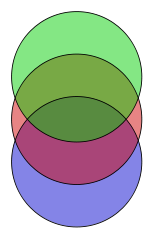
Deductive fallacy
Encyclopedia
A deductive fallacy is defined as a deductive argument
that is invalid. The argument itself could have true premise
s, but still have a false conclusion. Thus, a deductive fallacy is a fallacy
where deduction goes wrong, and is no longer a logical process.
Other logical fallacies include:
In philosophy
, the term logical fallacy properly refers to a formal fallacy
—a flaw in the structure of a deductive
argument, which renders the argument invalid
.
However, it is often used more generally in informal discourse to mean an argument that is problematic for any reason, and thus encompasses informal fallacies
as well as formal fallacies—valid but unsound
claims or poor non-deductive argumentation.
The presence of a formal fallacy in a deductive argument does not imply anything about the argument's premises or its conclusion (see fallacy fallacy). Both may actually be true, or even more probable as a result of the argument (e.g. appeal to authority), but the deductive argument is still invalid because the conclusion does not follow from the premises in the manner described. By extension, an argument can contain a formal fallacy even if the argument is not a deductive one; for instance an inductive argument that incorrectly applies principles of probability
or causality
can be said to commit a formal fallacy.
 In the strictest sense, a logical fallacy is the incorrect application of a valid logical principle or an application of a nonexistent principle:
In the strictest sense, a logical fallacy is the incorrect application of a valid logical principle or an application of a nonexistent principle:
This is fallacious. And so is this:
Indeed, there is no logical principle that states:
An easy way to show the above inference as invalid is by using Venn diagram
s. In logical parlance, the inference is invalid, since under at least one interpretation of the predicates it is not validity preserving.
People often have difficulty applying the rules of logic. For example, a person may say the following syllogism
is valid, when in fact it is not:
"That creature" may well be a bird, but the conclusion
does not follow from the premises. Certain other animals may also have beaks. Errors of this type occur because people reverse a premise. In this case, "All birds have beaks" is converted to "All beaked animals are birds." The reversed premise is plausible because few people are aware of any instances of beaked creature besides birds—but this premise is not the one that was given. In this way, the deductive fallacy is formed by points that may individually appear logical, but when placed together are shown to be incorrect.
Argument
In philosophy and logic, an argument is an attempt to persuade someone of something, or give evidence or reasons for accepting a particular conclusion.Argument may also refer to:-Mathematics and computer science:...
that is invalid. The argument itself could have true premise
Premise
Premise can refer to:* Premise, a claim that is a reason for, or an objection against, some other claim as part of an argument...
s, but still have a false conclusion. Thus, a deductive fallacy is a fallacy
Fallacy
In logic and rhetoric, a fallacy is usually an incorrect argumentation in reasoning resulting in a misconception or presumption. By accident or design, fallacies may exploit emotional triggers in the listener or interlocutor , or take advantage of social relationships between people...
where deduction goes wrong, and is no longer a logical process.
Logical fallacy
The standard Aristotelian logical fallacies are:- Fallacy of four termsFallacy of four termsThe fallacy of four terms is the logical fallacy that occurs when a syllogism has four terms rather than the requisite three. This form of argument is thus invalid.- Explanation :Categorical syllogisms always have three terms:...
(Quaternio terminorum); - Fallacy of the undistributed middleFallacy of the undistributed middleThe fallacy of the undistributed middle is a logical fallacy, and more specifically a formal fallacy, that is committed when the middle term in a categorical syllogism is not distributed in the major premise...
; - Fallacy of illicit process of the majorIllicit majorIllicit major is a logical fallacy committed in a categorical syllogism that is invalid because its major term is undistributed in the major premise but distributed in the conclusion.This fallacy has the following argument form:#All A are B...
or the minorIllicit minorIllicit minor is a logical fallacy committed in a categorical syllogism that is invalid because its minor term is undistributed in the minor premise but distributed in the conclusion....
term; and - Affirmative conclusion from a negative premiseAffirmative conclusion from a negative premiseAffirmative conclusion from a negative premise is a logical fallacy that is committed when a categorical syllogism has a positive conclusion, but one or two negative premises.For example:...
.
Other logical fallacies include:
- The self-reliant fallacyBegging the questionBegging the question is a type of logical fallacy in which the proposition to be proven is assumed implicitly or explicitly in the premise....
In philosophy
Philosophy
Philosophy is the study of general and fundamental problems, such as those connected with existence, knowledge, values, reason, mind, and language. Philosophy is distinguished from other ways of addressing such problems by its critical, generally systematic approach and its reliance on rational...
, the term logical fallacy properly refers to a formal fallacy
Formal fallacy
In philosophy, a formal fallacy is a pattern of reasoning that is always wrong. This is due to a flaw in the logical structure of the argument which renders the argument invalid...
—a flaw in the structure of a deductive
Deductive reasoning
Deductive reasoning, also called deductive logic, is reasoning which constructs or evaluates deductive arguments. Deductive arguments are attempts to show that a conclusion necessarily follows from a set of premises or hypothesis...
argument, which renders the argument invalid
Validity
In logic, argument is valid if and only if its conclusion is entailed by its premises, a formula is valid if and only if it is true under every interpretation, and an argument form is valid if and only if every argument of that logical form is valid....
.
However, it is often used more generally in informal discourse to mean an argument that is problematic for any reason, and thus encompasses informal fallacies
Informal fallacy
An informal fallacy is an argument whose stated premises fail to support their proposed conclusion. The deviation in an informal fallacy often stems from a flaw in the path of reasoning that links the premises to the conclusion...
as well as formal fallacies—valid but unsound
Soundness
In mathematical logic, a logical system has the soundness property if and only if its inference rules prove only formulas that are valid with respect to its semantics. In most cases, this comes down to its rules having the property of preserving truth, but this is not the case in general. The word...
claims or poor non-deductive argumentation.
The presence of a formal fallacy in a deductive argument does not imply anything about the argument's premises or its conclusion (see fallacy fallacy). Both may actually be true, or even more probable as a result of the argument (e.g. appeal to authority), but the deductive argument is still invalid because the conclusion does not follow from the premises in the manner described. By extension, an argument can contain a formal fallacy even if the argument is not a deductive one; for instance an inductive argument that incorrectly applies principles of probability
Probability
Probability is ordinarily used to describe an attitude of mind towards some proposition of whose truth we arenot certain. The proposition of interest is usually of the form "Will a specific event occur?" The attitude of mind is of the form "How certain are we that the event will occur?" The...
or causality
Causality
Causality is the relationship between an event and a second event , where the second event is understood as a consequence of the first....
can be said to commit a formal fallacy.
Example

- Most Rimnars are Jornars.
- Most Jornars are Dimnars.
- Therefore, most Rimnars are Dimnars.
This is fallacious. And so is this:
- People in Kentucky support a border fence.
- People in New York do not support a border fence.
- Therefore, people in New York do not support people in Kentucky.
Indeed, there is no logical principle that states:
- For some x, P(x).
- For some x, Q(x).
- Therefore for some x, P(x) and Q(x).
An easy way to show the above inference as invalid is by using Venn diagram
Venn diagram
Venn diagrams or set diagrams are diagrams that show all possible logical relations between a finite collection of sets . Venn diagrams were conceived around 1880 by John Venn...
s. In logical parlance, the inference is invalid, since under at least one interpretation of the predicates it is not validity preserving.
People often have difficulty applying the rules of logic. For example, a person may say the following syllogism
Syllogism
A syllogism is a kind of logical argument in which one proposition is inferred from two or more others of a certain form...
is valid, when in fact it is not:
- All birdBirdBirds are feathered, winged, bipedal, endothermic , egg-laying, vertebrate animals. Around 10,000 living species and 188 families makes them the most speciose class of tetrapod vertebrates. They inhabit ecosystems across the globe, from the Arctic to the Antarctic. Extant birds range in size from...
s have beaks. - Octopuses have beaks.
- Therefore an octopus is a bird.
"That creature" may well be a bird, but the conclusion
Conclusion
-Logic:*Logical consequence*Affirmative conclusion from a negative premise, a logical fallacy-Music:*Conclusion , the end of a musical composition*The Conclusion, an album by Bombshell Rocks*Conclusion of an Age, an album by the band Sylosis...
does not follow from the premises. Certain other animals may also have beaks. Errors of this type occur because people reverse a premise. In this case, "All birds have beaks" is converted to "All beaked animals are birds." The reversed premise is plausible because few people are aware of any instances of beaked creature besides birds—but this premise is not the one that was given. In this way, the deductive fallacy is formed by points that may individually appear logical, but when placed together are shown to be incorrect.

